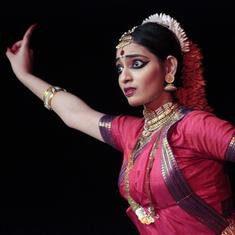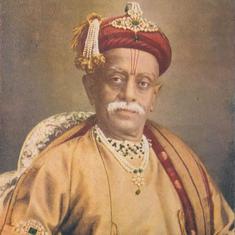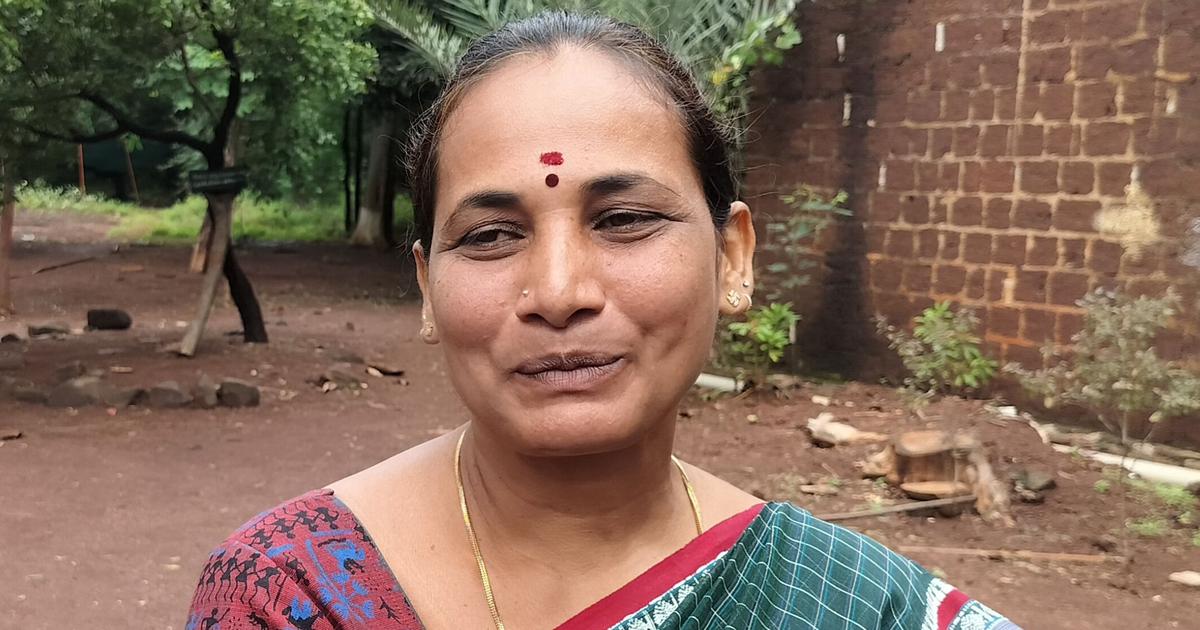There’s a saying: when women gossip by the pond, the fish dive under rocks, unable to bear the gossip. One day, five of us took our cows to the pond, letting them graze on the fragrant green grass floating in the water. I have a brown cow that’s always desperate for grass. The moment it sees green grass, it charges, dragging the rope – and me along with it – straight into the field. It does not stop until its mouth is inside the grass.
My co-sister’s cow is a sly one, with red-tipped horns. It grazes quietly, then stabs distracted cows, having killed two before. “It will pay to get rid of this red one,” Grandmother urged. We tied good cows away from it, sat at a distance, and chatted while they ate. While the silent cows munched away, we were busy with small talk.
My sister-in-law limped over, sat with legs outstretched – pain did not allow her to fold them. “What’s wrong?” Chinnamma asked.
“I curse the hour I was born – Mother should have taken me with her when she died,” she wept.
“Don’t speak ill of the dead,” I scolded. “We’ll all go someday.”
“What can I do? My husband’s fists fly. He is like that fellow who fought in the village and went to clean his filth at the pond. There are eight people in the house, and he hits me irrespective of who he is mad at on any day. Last night, I made oorubindi – a dish made with fried grains and chilli paste –instead of curry. ‘Did you make this just because it was easy for you?’ he shouted, tossing the rice away. I snapped, ‘It’s fresh, why can’t you eat it?’ He hurled the sangati ladle at me – a thick wooden spoon used for sangati, a lump of finger millet flour mixed with rice and water – and it hit me square on the thigh,” she said, revealing a palm-sized black patch on red skin. Tears welled in our eyes.
“Don’t cry. He’s a rogue. He would have understood the pain if he was hit instead. One should pinch themselves before pinching others,” we consoled. “He tricked my family into marriage, then showed his true colours. It is not just him. No one should be born as a woman – none we know is happy,” she said, wiping tears.
“My husband’s usually good,” Chinnamma said. “Today, my stars faltered. A saree seller came when we were about to fetch water. I couldn’t shop nor could I skip. I watched women haggle; he shouted, ‘Who’re you eyeing? Where do you have money to buy sarees?’ This made me angry. I had just stood there. Why should he talk like that? I also retorted, we had a big quarrel, and are not talking to each other now,” my chinnamma narrated the story.
“My husband does not say a word if someone comes to fight with him. But if I say something, he is ready to quarrel. He shows all his anger towards the villagers on me. I am the lowliest person. He is a domesticated snake for the village and a wild one at home,” I added.
Attha spoke. “Your husbands perhaps rebuke you in private, when no one is around. My husband is different. He looks for opportunities when visitors are around, and starts his tirade after making me cook for them. The visitors who watch are good for nothing themselves. I am normally silent despite the rebuke in front of others, and he perhaps thinks I am a very obedient wife. Do you know our English teacher Tulasi? By her looks, one wonders if she was born to a white man. It appears that a few strands of gray hair on the head makes a woman pious all of a sudden. If she visits our house, my husband loses a sense of reality. His body bulges in excitement, and he starts narrating all our family matters to her. Is that necessary? We may tell others about our health issues, but family matters should remain private. When he does that with Tulasi teacher, my hair rises, and I get so angry that I feel like chopping his head off and putting a bottu on my face with that blood. Since I cannot do that, I just walk away grinding my teeth”, she chimed in.
Papulu laughed, “We clash only on this: if I please him at night, he mills millets, tends cattle, fills the tubs for the animals to drink, cleans the barn and is cheerful. If I’m sick or unwilling, he wakes late, his face like salt-sputtered fire, itching to fight. Who has the energy for this amidst our daily struggles, vadina?” All of us laughed.
Akka said, “Mine won’t cook, he waits for me. If I am sick or away, he scavenges neighbours and will not go near the stove. He does not think about cleaning the house, washing utensils, or general home maintenance when I am not around. He makes the house a jungle and lives in it as if nothing has changed. If he sits in front of the television, there is no question of getting up even if termites gather under his bottom. He sits there like that until I return and cook. My grandmother used to say that everyone should eat tasty food cooked by themselves at least once in their life before they die. If not, after they die, God will cut off the limbs of people who always ate food cooked by someone, and use it as cooking fuel! I worry about the future of my husband’s arms in God’s hands!” she said.
“Is there no man in the village who understands us?” I asked.
My pinnamma said, “My co-sister’s son has two wives and has been twenty years married, but has never hit them. He remarried as his first wife did not give him sons. He is hardworking, sober, filial. They are four siblings, but he is the one who takes care of his parents now. He is a bit stingy but that is alright.”
“Guvvalodu’s decent,” Peddamma added. “He works without interfering with other things and gives all his earnings to his wife. He drinks with some of the money he gets, but he never says a word against his wife or anyone else in the village. He eats what he is given, and sleeps. This is way better than others.”
My vadina recalled, “What about the man with the large eyes?” She continued, “His entire family is extremely stingy. They wouldn’t even shoo away a crow while eating, as they refuse to let even the smallest grains of rice on their hands go to waste. They never offer assistance to anyone in need and lead a highly secluded life. Yet, when they encounter any trouble, they expect everyone to rush to their aid! No one benefits from their kindness except themselves.”
“Our Juttanna is like this too! He is a capable person but does not go against his wife’s wishes, and only wants to lead a comfortable life. A good husband for his wife, but a terror to others,” my sister-in-law remembered.
“Every woman suffers because of her husband. If there is one woman who does not face any such problems, her husband’s name is Mallanna!” vadina declared. “His wife never complains. I haven’t seen his wife complain about him at all. He is the ideal husband. He neither drinks nor roams around in bad company. He has two children who are married. His wife is not a very efficient person, but he has never criticized her. Everyone in the village is his friend, from an infant to an old man. He is never jealous of other people’s happiness. The couple always greet everyone with a smile on their faces and people say that speaking with Mallanna for a few minutes can make even a distressed person happy for a few moments. He does not fight with anyone, and the couple are always ready to narrate a story or perform a dance when there is an event at someone’s home. He knows all sorts of stories from our traditional books to modern ones. You have to watch the couple narrate stories and sub-stories while performing. Even if his wife does something wrong, Malli does not question her. He is an assured man.
If we stand in front of their house, we see both of them sharing the household tasks without gender differences. Seeing them makes me happy. Mallanna does not even get thoughts of troubling others and is always ready to help those who are in need. If someone asks him for food, he does not hesitate to give what he has in his hand right away. If he lends money, he ensures collecting it back at the right time. If he borrows from someone, he is prompt at returning it by the promised date. He is always respectful to people, new or old, and walks away silently when someone raises their voice against him unnecessarily. There is not a single person in this village who has a complaint about Mallanna.
A man should live a life like that. ‘The sun rises every day because of the goodwill from pious people living in all the four corners,’ our elders say. Mallanna is the only such person in our village. A couple more people like him would give us the much-needed balance and keep others in check. We were all born around the same time as him, and are all getting old. We should perhaps celebrate the marriage of Mallanna and his wife. If you are pure in your head and your stomach, your face shines bright as Mallanna’s,” vadina ended her praise for Mallanna. All of us women decided to vote for Mallanna as the best man of the village. By that time, the cows had fed themselves well and began crying for attention. We ended our chat and took them home.

Excerpted with permission from ‘We Vote for Mallanna!’ in The Hunger That Moved a Goddess, Endapalli Bharathi, translated from the Telugu by VB Sowmya, South Side Books.










